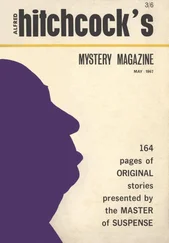Стив Хокенсмит - Alfred Hitchcock’s Mystery Magazine. Vol. 51, No. 6, June 2006
Здесь есть возможность читать онлайн «Стив Хокенсмит - Alfred Hitchcock’s Mystery Magazine. Vol. 51, No. 6, June 2006» весь текст электронной книги совершенно бесплатно (целиком полную версию без сокращений). В некоторых случаях можно слушать аудио, скачать через торрент в формате fb2 и присутствует краткое содержание. Город: New York, Год выпуска: 2006, ISBN: 2006, Издательство: Dell Magazines, Жанр: Детектив, на английском языке. Описание произведения, (предисловие) а так же отзывы посетителей доступны на портале библиотеки ЛибКат.
- Название:Alfred Hitchcock’s Mystery Magazine. Vol. 51, No. 6, June 2006
- Автор:
- Издательство:Dell Magazines
- Жанр:
- Год:2006
- Город:New York
- ISBN:0002-5224
- Рейтинг книги:5 / 5. Голосов: 1
-
Избранное:Добавить в избранное
- Отзывы:
-
Ваша оценка:
- 100
- 1
- 2
- 3
- 4
- 5
Alfred Hitchcock’s Mystery Magazine. Vol. 51, No. 6, June 2006: краткое содержание, описание и аннотация
Предлагаем к чтению аннотацию, описание, краткое содержание или предисловие (зависит от того, что написал сам автор книги «Alfred Hitchcock’s Mystery Magazine. Vol. 51, No. 6, June 2006»). Если вы не нашли необходимую информацию о книге — напишите в комментариях, мы постараемся отыскать её.
Alfred Hitchcock’s Mystery Magazine. Vol. 51, No. 6, June 2006 — читать онлайн бесплатно полную книгу (весь текст) целиком
Ниже представлен текст книги, разбитый по страницам. Система сохранения места последней прочитанной страницы, позволяет с удобством читать онлайн бесплатно книгу «Alfred Hitchcock’s Mystery Magazine. Vol. 51, No. 6, June 2006», без необходимости каждый раз заново искать на чём Вы остановились. Поставьте закладку, и сможете в любой момент перейти на страницу, на которой закончили чтение.
Интервал:
Закладка:
I joined the cluster of men Mides had pointed out and introduced myself. I got to the point, asking what they could tell me of Parmades.
One of the four men shrugged. One got up and walked away. One of the other two, a young man with a face worthy of Apollo himself, said he’d talked with Parmades.
“Several times,” he said, rather proudly. “Parmades just didn’t understand that all moral beliefs are mere human devices. I had to explain several times that the truest guide for behavior is to do what is expedient.”
The other young man, with a snub nose more like Socrates’ than like a god’s, smiled. “Yes, Eteocles, you did explain over and over. ”
Eteocles nodded, failing to get the sarcasm. He’d also failed to understand that while we Sophists saw that belief in the divine for moral guidance was ruled by one’s culture, we also believed that behavior should be guided by what promoted excellence and the common good.
“I take it Parmades did not agree with you, Eteocles?” I asked.
“No. He did not. My arguments overwhelmed him.”
I looked to the other young man.
“Parmades did not argue. He was quiet, reserved. I had the feeling he was concerned with other things.”
The man seated alone scoffed. “Parmades was a sneaky one.”
“Sneaky?” I queried, noting that the man’s accent marked him as a man of Chios, in the league of Athens. I wondered about the welts on his hands.
The man stuffed a hunk of goat cheese into his mouth. After a bit, he spoke. “You couldn’t get an opinion out of him. Just questions. I told him our Chian honey was far tastier than your Athenian honey, even to the dullest of tongues and not just us beekeepers. Our bees are blessed by the gods.”
Like Parmades, I didn’t argue the point, though I understood the pocked hands then: multiple bee stings. I would have liked to question him about why the gods concerned themselves with bee quality, but I had more important concerns. “What questions did he have?”
“He asked if I’d recognize a Spartan when I saw one, even one in disguise. Stupid question. Who wouldn’t recognize those longhaired sacks of muscles with no brains.”
“Why did you find Parmades sneaky?”
The man spat out a bit of cheese. “Fishbrain. A man who doesn’t like to argue and who asks too many questions is sneaky.” He gave me a knowing look and stomped out of the tavern.
Eteocles laughed. “Parmades also wanted to know if I knew which of the priests here were particularly trustworthy. As if a priest could explain anything. Parmades did not understand that the soul is a natural part of the material world.” Eteocles leaned back pompously against the wall.
I hoped that the beetle he’d leaned against would get into his tunic. Eteocles was one of the young men of Athens who had given Sophists a bad name. But though he’d failed to detect the worry that lay behind Parmades’ questions, he’d given me useful information. Parmades had been troubled about a Spartan and was looking for a trustworthy priest to speak to. He’d obviously had doubts about some of the priests. I wondered if he’d thought Ampheus trustworthy or not.
I was about to talk to Mides when Selkine entered the tavern, accompanied by the servant woman she’d hired here at Delphi. She stopped in the doorway and looked round. “Kleides,” she said, “do let’s go upstairs to our room.” She motioned to me to follow her upstairs.
The glow in her eyes compelled me to follow her. Something had excited Selkine, and she was always at her most beautiful when excited, her eyes a bright golden brown, her movements swift and flowing, like those our poets give to the huntress goddess, Artemis.
I followed her, the pull of Aphrodite, our goddess of love, turning my brain to barley mush. At that moment, only Selkine mattered. Is there any greater fool than a Sophist in love?
I closed the door of our room behind me and reached for Selkine.
She stepped back. “Not now, Kleides. I have something important to tell you.”
“Important,” I repeated dully. I would have been hard pressed at that moment to properly identify myself if I had to.
“Yes. I was in the village with my servant woman. We stopped at the house of a farmer renting carts and providing food and other items for pilgrims. I wanted some good olive oil for my skin. Inside the house, I saw a man seated on a stool by a small wooden table. It was dim inside and it took a moment for my eyes to see clearly. But then I recognized the man. Kleides, are you listening to me?”
I blinked several times and tried to forget that the call of Aphrodite would have been quite visible had my tunic not been loose and bulky. “I’m listening,” I managed.
“I recognized him. He was the man with the badly cut hair who was in the tavern when we arrived.”
“I see,” I said, not seeing at all what had excited Selkine.
“I should have known that evening of our arrival. I had noticed how he was drinking, but I simply did not recognize its importance, so I did not think of what he was. Recall that he gagged on the wine he’d mixed with water. But I knew today. The man was eating a black broth and drinking a dark wine. He had no cup for water to mix with the wine.”
“Black broth,” I said, alert now, “and undiluted wine. A Spartan.”
“Of course. Only Spartans eat that vile broth of vinegar, salt, pork stock, and animal blood. But, Kleides, the man did not have the long hair of the Spartans.”
I frowned in thought. “No, his hair was cut short. He was pretending to be something other than a Spartan. The only Spartans who travel as Spartans are diplomats. If a Spartan leaves Sparta with his hair cut, he is on a spy mission.”
“Something else, Kleides. The man had with him a cloak of dark, rough wool. I know there are many such cloaks, but when he swung it over his shoulders, I felt I had seen his figure before.”
“At dusk when we left the sanctuary yesterday.”
“Exactly,” Selkine said.
I went up to her and took her by the shoulders. “Selkine, you have proven yourself the real student of nature today. You’ve beaten me at my own game of observation. And you may very well have solved the murder of Parmades.”
Selkine’s eyes glittered. “So, you believe he was murdered?”
“I’m sure of it. And you have just given me the motive. If the Spartan is here on a spy mission to discover what he could about our plans for war, Parmades may have realized it. Like you, he obviously suspected the man of being Spartan. He may have known, too, that one of the priests was involved with the Spartans, relaying information picked up from pilgrims.”
Selkine frowned. “There was a priest at the sanctuary yesterday talking to Parmades.”
“Yes. A priest named Ampheus. I wonder if he told Parmades to meet him at the top of the shining cliffs.”
“But why would Parmades have gone up if he suspected a conspiracy?”
I frowned again. “I don’t know. But priests can be formidable, especially to someone not usually skeptical about religious matters. I’ll have to talk to Ampheus again.” I looked at Selkine’s beautiful face. “Selkine, avoid the Spartan. Promise me. If he suspects that you know what he is, you could be in danger.”
“As are you. I know you cannot take me with you. But take someone. Mides, perhaps.”
I agreed and turned to leave, but stopped at the door and looked back at Selkine. I think it was then that I saw Selkine for the first time — not as I did so many years ago in our port of Piraeus when she was very young, clever, and sure of her beauty, but as she had become: full, experienced in life and love, aware of her powers of mind as well as body. I realized with a shock that I loved her. “Avoid the Spartan,” I said. “Promise.”
Читать дальшеИнтервал:
Закладка:
Похожие книги на «Alfred Hitchcock’s Mystery Magazine. Vol. 51, No. 6, June 2006»
Представляем Вашему вниманию похожие книги на «Alfred Hitchcock’s Mystery Magazine. Vol. 51, No. 6, June 2006» списком для выбора. Мы отобрали схожую по названию и смыслу литературу в надежде предоставить читателям больше вариантов отыскать новые, интересные, ещё непрочитанные произведения.
Обсуждение, отзывы о книге «Alfred Hitchcock’s Mystery Magazine. Vol. 51, No. 6, June 2006» и просто собственные мнения читателей. Оставьте ваши комментарии, напишите, что Вы думаете о произведении, его смысле или главных героях. Укажите что конкретно понравилось, а что нет, и почему Вы так считаете.












